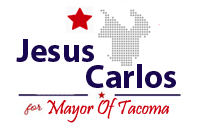The cost of housing in Tacoma has skyrocketed in recent years, putting strain on working families and contributing to a growing homelessness crisis. The median home value in the city is around $454,000, and rents have risen steadily. At the same time, the January 2024 point-in-time count found 2,661 people experiencing homelessness in Pierce County (a 23% increase over the previous year). Jesus believes housing is a human right – Tacoma must take bold action to ensure everyone has a safe, affordable place to live. The housing platform will deliver both immediate relief and long-term solutions:
- Expand Affordable Housing Supply: Support and accelerate the City’s innovative “Home in Tacoma” initiative to allow more housing types (duplexes, triplexes, cottage housing, etc.) in traditionally single-family zones. We can spur the private market into creating thousands of new housing units by updating zoning and reducing barriers. At the same time, Jesus will aggressively push to build and preserve dedicated affordable housing. The City’s Affordable Housing Action Strategy set a goal of adding 6,000 affordable units by 2028; currently, about 2,500 units have been produced, roughly halfway to the goal. We will fast-track this effort by using public land for affordable housing developments, partnering with nonprofits and the Tacoma Housing Authority, and leveraging state/federal housing funds. The goal is to meet and exceed the 6,000-unit target, aiming for at least 7,500 total affordable units by 2030. Every project will include metrics like the number of units, income levels served, and timeline, to ensure accountability in delivery.
- Tenant Protections & Anti-Displacement: Preventing the displacement of current residents is as important as building new housing. Tacoma has learned from Seattle and others that development must not come at the cost of pushing out long-time communities. Jesus will implement the city’s 21-point Anti-Displacement Strategy to protect vulnerable residents. This includes stronger tenant protections (enforcing just-cause eviction rules, caps on excessive rent increases within what state law allows and providing free landlord-tenant mediation services). We’ll expand rental assistance programs and legal assistance to help renters stay in their homes. For low-income homeowners, increase home repair grants and property tax relief funding so rising costs don’t force them out. The city will also support community land trusts and down-payment assistance for first-time homebuyers who graduated from a high school or University in Tacoma, helping families build equity and stay rooted. We will measure success by monitoring displacement-risk areas in East Tacoma. For stability, e.g., slower eviction rates and maintaining or increasing the percentage of long-time residents who can remain in place even as neighborhoods improve.
- Homelessness Intervention with Housing First: A humanitarian crisis demands urgent action. Jesus’s plan will uphold the proven “Housing First” model – moving people into safe housing as the first step, then providing wraparound services (mental health care, addiction treatment, job counseling) to address underlying issues. The City will increase the supply of emergency shelter and transitional housing in the near term: support the opening of additional micro-shelter villages (tiny home communities) and sanctioned encampments with hygiene facilities as a safer alternative to street camping. We will also work with Pierce County to utilize buildings into shelters or permanent supportive housing (for example, exploring motel conversion programs or using any vacant city-owned buildings). Crucially, we will coordinate with regional partners so that every chronically homeless individual in Tacoma is connected to a caseworker and a path toward permanent housing. Investing in and housing with on-site services, we help people stay housed. Our target is to reduce unsheltered homelessness by 50% by 2027, and to ensure no veteran or child is sleeping on Tacoma’s streets. Progress will be tracked via annual homeless count data and service utilization rates, with transparency on the best approaches.
- Streamlined Development & Smart Growth: The City will make building all types of housing easier. Jesus will direct the Planning and Land Use departments to streamline permitting for infill housing and eliminate unnecessary delays, following examples like Seattle’s expedited permitting for pre-approved ADU designs. We will expand permit fee waivers or density bonuses for projects with affordable units. In areas near transit hubs, encourage transit-oriented development (mixing housing and commercial space near the coming light rail extension and BRT lines) to increase mobility and reduce car dependency. Every new development will be encouraged to include green space and consider environmental impacts, aligning housing growth with our climate goals. The administration will publish quarterly reports on building permits and housing units produced, to keep the pressure on, meeting our housing targets.
- Neighborhood Quality & Homelessness Prevention: Improving housing affordability isn’t just about new buildings – it’s also about maintaining quality of life in residential neighborhoods. Jesus will work to ensure that as we address homelessness, we also respond to community needs about public spaces. This means increasing funding for neighborhood clean-ups and graffiti removal and ensuring that parks and business districts are welcoming for all. We will bolster programs that prevent people from falling into homelessness, for example, scaling up the city’s rental assistance and foreclosure prevention funds, and partnering with utilities to expand utility bill assistance. Given that the leading reported cause of homelessness in Pierce County is now a lack of affordable housing (surpassing family crises), our prevention efforts will focus on keeping housing costs manageable for those at risk. Success will be measured by fewer people entering the homeless system each year and shorter durations of homelessness for those who do.
Outcome Metrics: Housing progress will be evaluated by tracking the number of new units (especially affordable units) added each year, rental cost trends, and the size of the homeless population. Jesus will appoint a Housing Commissioner to oversee inter-agency efforts and publicly share metrics, such as progress toward the 6,000-unit affordable housing goal, vacancy rates, and homeless shelter utilization. The ultimate measure of success is Tacoma, where no one has to sleep outside, and working families can afford to live and thrive in the city they call home.

